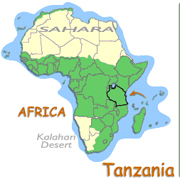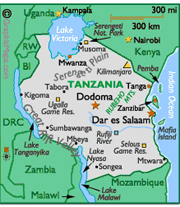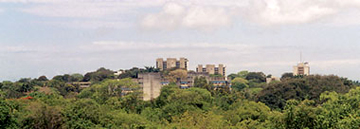

About the Location
Dar es Salaam literally means "haven of peace” and was founded in 1862 by the Sultan of Zanzibar. It is Tanzania's largest city and its commercial capital, with a population of about 3.5 million. Located on the coast, it is an ideal seaport with a European-style center and residential areas and marketplaces along the outskirts. Dar es Salaam is a main industrial center and was the seat of government until the recent transfer of parliament and major government departments to the new capital city of Dodoma.
Culturally, Tanzania is a mixture of over 120 different ethnic groups. The majority of the people speak Bantu languages, but almost everyone uses Kiswahili, the national and official language, as their medium of communication. Major religions include Islam, Hinduism, Christianity, and traditional African religions. Tanzania provides students with a unique view of the cultural, political, and economic issues of a developing African society.
For more information on Tanzania, please refer to the State Department’s Country-Specific Information.
The University of Dar es Salaam
The University of Dar es Salaam, the major university of Tanzania, consists of six faculties, five institutes, and the Muhimbili University College of Health Sciences. The University enrolls 5,000 students (85% male), with the majority from Tanzania and smaller numbers from Kenya, Uganda, Burundi, and Zambia. The main campus is popularly known as Mlimani (which translates as "at the hill") and is approximately ten miles from downtown Dar es Salaam. It sits on a 1625-acre site spread across the hilltops of a ridge that runs parallel to and overlooks the coast, providing an excellent view of some beautiful areas of the city. Faculty and staff live in University neighborhoods surrounding the campus, and most students live in dorms in the heart of the site. The campus has a bookstore, post office, a couple of banks, a telephone service store, and several cafes. Other needs can be met by riding a "dala-dala" (dalluh-dalluh) into the city, which takes about 25 minutes and costs the equivalent of a dime. These vans run virtually non-stop from the University to town, departing from the computer center and the campus gate. Cab service to downtown costs 10,000.00-15,000.00 Tanzania shillings (TZS) (about $10.00).

The Institute of Kiswahili Studies, University of Dar es Salaam
The course will be based at the University of Dar es Salaam’s prestigious Institute of Kiswahili Studies (IKS), the only institute of its kind, which focuses solely on research and scholarship in the development of the Kiswahili language. IKS is the most respected Swahili research institute in the world. It has highly qualified faculty members who engage both in academic research and teaching Swahili to local and international students at all levels. Formerly known as the Institute of Kiswahili Research (IKR), the Institute was revamped and expanded in 2009 into a full-fledged school of the University of Dar es Salaam. It now offers B.A. degrees in Kiswahili Studies and hosts three departments: Kiswahili Language & Linguistics, Kiswahili Literature, and Kiswahili Research, Publications, & Communications.
Princeton in Dar es Salaam is hosted by the Kiswahili for International Students unit of the school, which has a number of learning/teaching and research facilities including a library, classroom/conference rooms with ethernet connection, a Kiswahili bookshop, and an archive of old Kiswahili manuscripts. Internet cafes and other computer facilities are available at an affordable cost within the campus.

